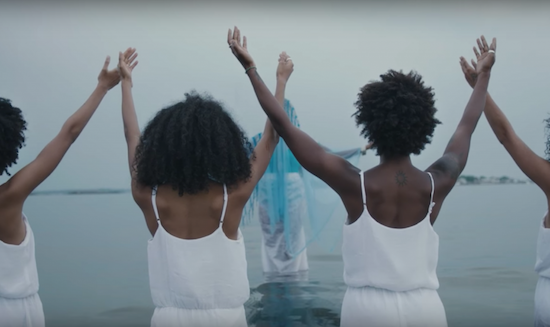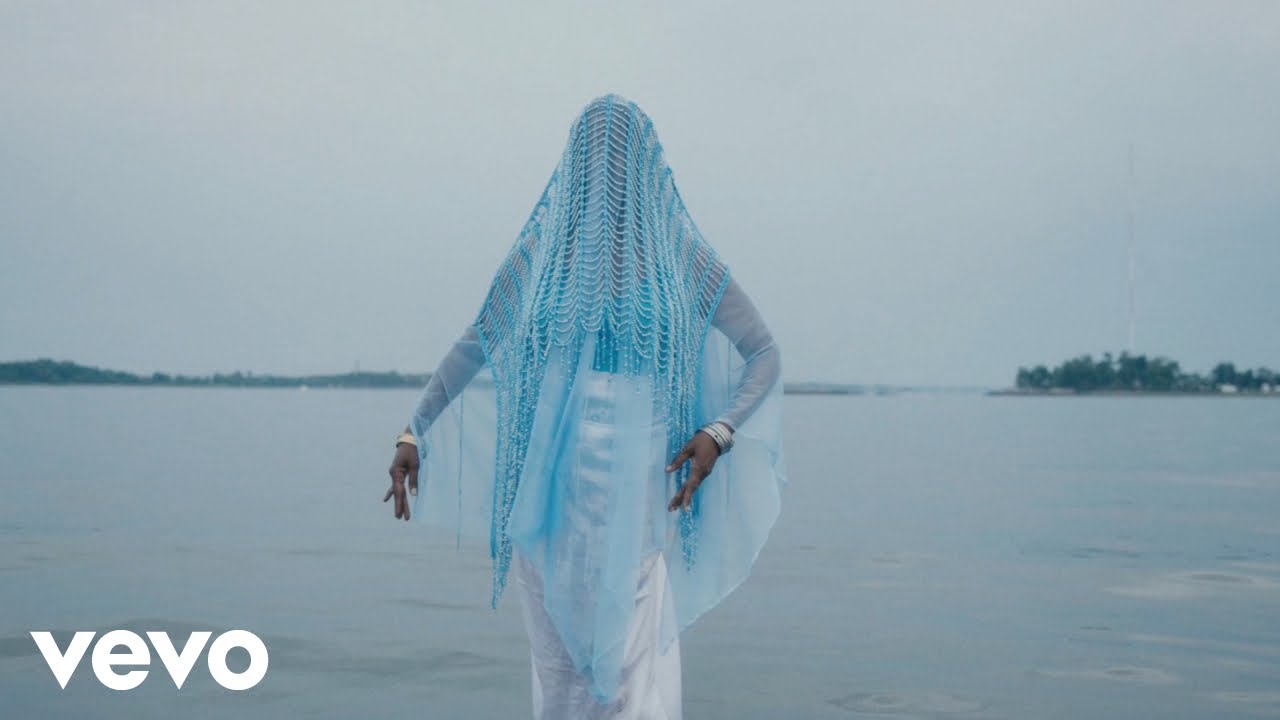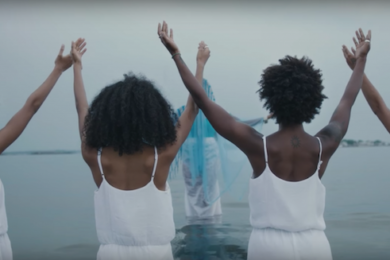Lana Del Rey recently used Twitter to suggest that her followers might like to use the mysterious arts of witchcraft to try to fight back against the worldly, macho power of Donald Trump. The media predictably frothed about her tips on auspicious times at which to cast spells, and the ingredients one might use to make them. Ever one to follow fashions, it seemed that Del Rey was jumping on what Salon last year termed "mysticore", part of a new trend for all things Occultish. Yet none seemed to tap into a less told history of far more importance – for black women a relationship with the magical traditions from the African diaspora holds a deeper significance and possesses an underlying subversive power. From Nina Simone to Princess Nokia, celebrations of the spiritual histories of black peoples have often come in defiant form, in resistance to a narrative that erases their side of the story. Even Beyoncé and the ever controversial Azealia Banks have also played a role in telling the tale of women of the diaspora vindicating their heritage through spirituality.
The hashtag #BlackGirlMagic has been a recurring social media favourite over the last year or so, an unabashed celebration of black womanhood succeeding against the odds, from Viola Davis to Michelle Obama. The association between black women and magic is usually made as a statement of wonderment at the resilience of a neglected and downtrodden people; the suggestion being that we must be beyond human to still be standing, let alone succeeding.
Yet the connection of magic and black women far predates the excited energy of celebrating our idols on social media. Indeed, it’s well-documented throughout musical history – long before Lana Del Rey conjured up her 140 characters. At the end of last year, videos of Azealia Banks cleaning the blood of sacrificed chickens from her cupboard landed on the internet alongside a ‘confession’ to three years practicing ‘brujeria’. The episode left her reputation in further tatters as she was branded "a batshit crazy… witch" who was "sacrificing innocent chickens for her amusement".
Even before Azealia Banks was more known for homophobic outbursts and a string of beefs than she was for her music, she was perfectly open about her relationship with her magic. Rapping on Broke With Expensive Taste‘s ‘Gimme A Chance’ in 2014, she refers to herself as a "superb witch in demand" before claiming that her success was no thanks to the "brujeria" (witchcraft) that was cast upon her. Her Twitter name, "Bruja del Bloque" (witch from the block), her Periscope broadcasts from "the witch cave" and interviews about the spells she practices, all took place long before her bloody cupboard made headlines.
Banks’ historically erratic and often incomprehensible behaviour meant that the incident itself was dismissed as part and parcel of her personality. But she was actually acting in part of a long-standing tradition – the roots of her ‘brujeria’ are certainly not unique.
Yemaya, who Banks states 2012 mixtape Fantasea was created in honour of, is the mother of the seas according to a number of belief systems which have emerged from the Yoruba faith. During the era of slavery and colonialism people who had descended from the Yoruba (of modern Nigeria) were forced to abandon their religions in the name of Christianity. Many, of course, disobeyed and the orishas (or deities) and practices of the Yoruba faith (including animal sacrifice) are still celebrated across the African diaspora through Santería in Cuba, Candomblé in Bahia, Brazil, Obeah in Jamaica and so on. Banks claims that she was called by Yemaya and eventually following numerous readings with different santeros (priests of santería) she became a palera, a sacred figure.
Yemaya (also spelled yemoja) along with Oshun, another orisha from the Yoruba faith, also features in the poetry of Warsan Shire made famous by Beyoncé’s Lemonade – a Google image search of ‘oshun’ will turn up results for her ‘Hold Up’ video or recent pregnancy photoshoot.
For African Americans, vindicating their ancestry with the celebration of the deities or practices of Yoruba faith is nothing new. In Nina Simone’s ‘Obeah Woman’ she refers to herself as "the Obeah woman from beneath the sea". Slavery and colonialism were resisted as much physically and intellectually as they were spiritually and culturally. Despite severe punishments, including death, for adhering to the old beliefs many slaves persevered, and these pillars of culture lasted through the centuries. In ‘Obeah Woman’, Simone, a passionate black activist, channels this spirit of resistance coupling it with a celebration of a faith that, at that time, was banned in Jamaica.
"Mama Yaya taught me about herbs. Those for inducing sleep. Those for healing wounds. Those for loosening the tongues of thieves. Those that plunge them into blissful rest. Those that put hope on the lips of the angry, the desperate and the suicidal. She taught me that everything lives, has a soul. That everything must be respected." – Maryse Conde from I, Tituba, Black Witch of Salem, a fictionalised account of a slave tried for witchcraft in the Salem Witch Trials.
The violent repression of Yoruba faith and its derivatives were to some degree ineffective but nevertheless consistent. For colonisers in Africa and Latin America healers were a particular thorn in the establishment’s side as they did not separate the practice of their religion with their use of natural medicine – essential for keeping the workforce healthy. Back in Europe, during the witch trials of the 16th and 17th Century European, healers, often called "cunning women", were held in equal contempt. These financially independent women who lived alone were often accused of being witches and jailed and/or executed.
Given the violent treatment of healers and contempt with which witches have historically been regarded, it’s pleasing to see so many women trying to reclaim these ideas, images and practices. Bronx-based Afro-Nuyorican (New Yorker/Puerto Rican) rapper Princess Nokia has most recently done this in her track ‘Brujas’, a celebration of womanhood framed within the spirituality of her African and Latin American ancestry. In it, she raps "Good witches, I fuck with / Bad bitches, we run shit".
The video opens with the Santerían chant called "Yemaya Olodo", sung for the orisha Yemaya, mother of the seas. She is depicted in the video as a faceless black woman bathed in jewellery and blue and white satins, knee deep in the ocean. Like Nina before her, Nokia’s celebration of her spirituality comes hand in hand with pride in her identity, referring to herself as "that Black-a-Rican bruja straight out from the Yoruba / that Black Native American, I vanquish all evil". The video itself is typical Nokia, a boastful celebration of sisterhood, as playful as it as badass, as middle fingers up they chant in unison: "don’t you fuck with my energy, don’t you fuck with my energy".
Princess Nokia has spoken out before about the reclamation of the word "bitch" in her work, but before the ‘Brujas’ video, it seemed unlikely that anyone would attempt to do the same with "witch". Unapologetic in her femininity, boyishness and heritage Nokia successfully plays with the concepts of witches, bitches and identity forging a new narrative for 21st Century "ghetto witches", as she puts it.
Recent releases from Stormzy and Chance the Rapper, which feature overtly gospel celebrations of faith, may suggest that we’re in some kind of spiritual renaissance in music by POC. While their spirituality is channelled through a Christian God, it’s refreshing to see that same spiritual zeal reaching towards a faith that speaks to the liberation and resistance of African traditions.
With black girls today regularly embracing their magic in one way or another, artists like Princess Nokia are creating the perfect space for a different kind of magic to be manifested. Speaking openly about her relationship with her ancestors and her spirituality, their reclamation of the word ‘witch’ and reframing of faiths of the African diaspora invites a new conversation about identity that offers a liberating spiritual path for black women looking into their ancestry – no crystal ball or scrying mirror required.




